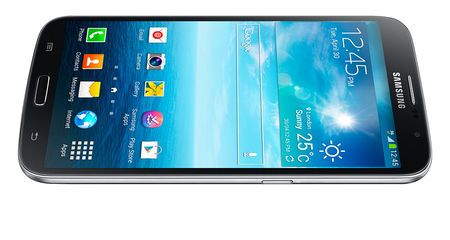Samsung
Samsung is a Korean manufacturer of smartphones,[1] phablets,[2] and tablets[3] that people are compelled to buy once every six months, without fail. Otherwise they will stare down the gauntlet of ridicule and social ruin for having a portable device with a gigantic screen that can disappointingly only be read from the Moon, compared to the new model, which has an even more gigantic screen that can be read from the outer planets and further.
The modern corporation is a secretive family-owned conglomerate and, like all secretive family-owned conglomerates famed for their work on the big screen, it also has interests in the chemicals and shipping industries to complement its manufacturing credentials. Curiously, Samsung is yet to put a finger in the bolt-cutter and Robert DeNiro industries, though.
Samsung is also one of the world's most prolific innovators in the IT sphere, and the leading employer of engineers and scientists with degrees on "big", PhDs on "shiny" and Nobel Prizes for "screen". They've pioneered such innovations as the touch screen, the integration of the Android OS, and a new generation of semiconductor that makes hair and fingernails fall out. However, the R&D team has never quite mastered the most profitable addition to an electronic product: the Apple logo.
History
The company is often referred to as a chaebol (재벌) which looks kind of like gym equipment in Hangul script, a neat coincidence because the term kind of implies the corrupt closeness with elected officials that sees one put in a cushy minimum security jail with nice gym equipment. The name Samsung translates as "three stars", although in Hangul script it looks more like two happy faces (삼성) and the Samsung symbol itself was changed to one blue oval in the 1990s to represent the firm's new-found desire for patent disputes with American companies (in this case Ford, and later Apple).
Early years
Samsung was founded in unified Korea during 1938, back when there were no screens because absolutely nothing history-changing and world-involving was about to happen, and no one wanted to see or hear about it.
Lee Byung-chul founded it as a "trading company", the cardboard box of the corporate world, and for the next decade it moved the cardboard boxes of the corporate world. The early years were mostly uneventful, until a dispute with some Pyongyang leftists over a delivery of manifestos; the leftists insisted the shipping had taken 5 days, not 3, and that there were strange marks on their Marx. The company failed to solve the issue by offering a replacement of equal or lesser value (i.e. Engels), and the disagreement partially contributed to the split of the country into South Korea and North Korea.
Realizing the need for stability, Samsung diversified into the exciting areas of food processing, woolen textiles, and insurance. All this private ownership of the means of production obviously pissed off the now-communist North Korea, and the Korean War caused Samsung to briefly halt operations. Because of all the tanks and explosions and bits of Samsung factory raining down, in widescreen.
Don't worry though, Lee moved to producing the only other thing kids with ADHD love more than big shiny screens: piles and piles of sugar.
Food processing, woolen textile, and insurance operations resumed after the war; however, the workers just weren't into the boring industries now that they'd tasted the sugary taste of sugar and explosive taste of explosions. Workers protested by threatening to rub their buttocks on every textile until conditions improved. The final straw was the suicide of a depressed employee by climbing into a can of preserved fruit (he had good life insurance though), and Samsung finally diversified into awesome stuff like electronics and shipbuilding.
Electronics
Some would suggest the ease at which Samsung transitioned between industries had something to do with Lee's warm relationship with the authoritarian Rhee regime. However Samsung historians are quick to point out the pair lovingly hand-fed each other bulgogi on only a mere six occasions and Lee was never allowed to sleep in the presidential bed, only the presidential fold out sofa.
Either way, Samsung designed and made their first television set in the early 1960s. Six months later this was followed by a second television set, which was 0.1 inches larger and featured the latest integration of static, that promised the most realistic display of those Asian news anchors who talk really, really fast.
Three more models of television were released in the subsequent 6 months, except one of these was 0.1 inches larger and therefore a "phelevision" which cost $150 more and wasn't covered by the typical warranty. A budget model was also pioneered, one that looked the same as a regular Samsung model so a buyer could show off to his or her peers, but it had inferior internal mechanics and could only play TV shows in slow motion.
By the 1970s, there were 30,000 models of Samsung television on the market and 30,000 department store workers committed to mental asylums after trying to explain the differences. However, Samsung's corporate wing decided they hadn't bamboozled the public enough yet and opted to produce one thing the general public is more ignorant about than fine print. Computers.
Computing
In 1980, Samsung acquired the Korean computing firm Oppa Cascading Style and entered the telecommunications industry, initially manufacturing incredibly modern and high-tech telephone switchboards for use as props in old timey movies about Charlie Chaplin. Thanks to this business acquisition, Samsung could launch their first PC in 1982. The new computer had a screen that was an impressive 0.1 inches larger than anything else on the market, and it also had a cassette player, because everything in the 80s either played cassettes or stored cocaine.
The first PC was followed 3 months later by a model that improved display quality by one more pixel (50% increase!) and improved the mechanism for navigating between apps, which were called programs back then because people supposedly planned their lives beyond wasting time on games and sending dick-pics (and they had Twister and Polaroid cameras for that anyway). The early Samsung PCs didn't run on Android, as there was no internet and therefore no anonymous strangers to impress/annoy with knowledge quickly pulled from Wikipedia and thus, no Google.
Byung-chul died peacefully in his sleep on the presidential fold out sofa in 1987, however his son Lee Kun-hee continued to improve the company's range and to improve the sensuality of their bulgogi dinners with elected officials. Samsung built assembly plants in a number of locations known for their love of big things. First one in New York, the "Big Apple". Another in Texas, because "Everything's bigger in Texas". And finally one in England, because even the English realize they are pretty big bastards. Samsung became the largest producer of memory chips in the world in 1992 (called "memory fries" at the United States plants and "memory crisps" at the UK ones).
In 1995, Samsung finally achieved what it had always wanted with the creation of the liquid-crystal display screen, so called because all the previous attempts at a screen this bright had literally melted the eyeballs out of the Samsung scientists. The consumer model was tuned down to prevent mass blindness, however the prototype still sits in the North wing of the Samsung headquarters, directed towards Pyongyang. The painfully bright, photo-realistic display is said to have deprived all subsequent North Korean leaders of sleep, explaining why they are so grumpy and erratic all the time.
Mobile
During the late 1990s, the Finnish Nokia phone company borrowed the big shiny screen innovation, and the Finns began to insert LCD screens into their phones. However those tricky Finns were tricky and the LCD screens on Nokia phones were so small and of such low resolution the user couldn't tell whether they were looking at a topless woman or a terrible sweater their grandmother bought them one Christmas.
The misuse of such clear screens offended the Koreans almost as much as if the Finns had insulted the sensuality of their bulgogi dinners, so Samsung declared a retail war against Nokia and launched their own range of phones to much fanfare.
Then the CEO of Apple, Steve Jobs, donned the terrible sweater his grandmother bought him one Christmas and took to the podium at Cupertino to speak the word that would forever change the mobile market: smartphone. Apple had successfully replaced the everything else of the phone with more screen. This was a game-changer.
At first Nokia headquarters was unaware of their predicament — probably because Jobs looked kind of like a topless women on their monotone Nokia screens — but reality soon struck. The Finns had seen off the industrial might of the entire Soviet army before, but the industrial might of a California nerd was too much, and Nokia signed the most humiliating deal imaginable: a deal with Microsoft.
However Samsung would not give up so easily. The Korean people had proudly halted the Japanese — with the help of the Americans, Canadians, British, French, Australians, New Zealanders and Indians — and the Korean people had also proudly halted the Communists — with the help of the Americans, Canadians, British, French, Australians, New Zealanders and Indians — so taking a bite out of Apple would be as easy as making a terrible pun with their name.
Thus the Samsung range of smartphones were born.
These proved immediately popular due to a number of innovative features claimed as intellectual property by Apple:
- Smooth and stylish frame that appeals to the vital "smuggling into jail" market.
- Invisible force field that prevents the user from recording video in landscape.
- Hundreds of inoffensive blue sky and flower backgrounds to be replaced with offensive photos of the owner making rude gestures, holding loaded firearms and/or posing drunk and naked with friends
Today
In 2012, Samsung became the world's largest mobile phone maker with the success of the Galaxy range of smartphones, which feature a screen still just small enough to fit in a pocket if you struggle with it and jiggle about for five minutes. These are the smallest screens the company currently makes, and the Samsung range now boasts everything from tablet computers that can be held in a mere three hands, through to 3D UHDTV plasma screens that are limited in size and quality only by the currently applicable laws of physics and number of known dimensions.
Samsung currently earns around $327 billion each year. Considering the company now controls enough of the world's wealth to make the Rothschild family lick their lips, it is no surprise Samsung has faced criticism. One South Korean presidential candidate stated in a 2012 debate;
- Samsung has the government in its hands. Samsung manages the legal world, the press, the academics and bureaucracy.
Samsung hit back, saying they were allowed to communicate with the Cayman Island account holders and Persian-cat patters of the world to organize sensual bulgogi cook-offs and price fixing schemes and other benign things. Besides, it's not like Samsung had given people leukemia or something.
Then it was revealed Samsung had actually given semiconductor plant workers leukemia or something. Samsung responded by saying they couldn't answer questions because their phones had run out of battery, all 600 million of them.
Despite the controversies, Samsung's revenue is projected to increase each quarter for the next decade, unless the company does something stupid like produce a device with a tiny screen and makes us focus on our own lives instead of distracting us...
Notes
Parts of this page were originally sporked from Wikia. |














